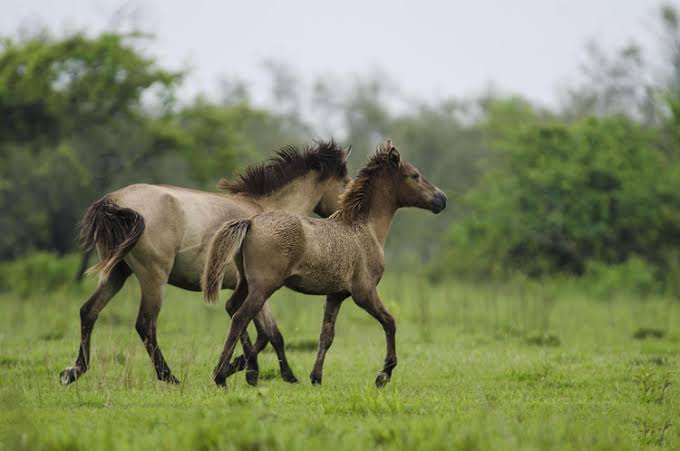DIBRUGARH, Dec 20: Tracing their lineage to the legendary warhorses of World War II, the feral horses of Dibru Saikhowa National Park are a living testament to resilience. Yet, despite their rugged existence, these free-roaming horses, once thriving in the park’s 340 square kilometres, now face an uncertain future as their population dwindles under mounting environmental pressures.
Typically found near water sources within a 5-6 km radius, these horses prefer grassy river flats and woodland areas, which allow them to remain alert to predators. But as the park’s landscape transforms due to floods and encroachment, these critical habitats are rapidly disappearing.

Descendants of domesticated stock, the feral horses have roamed the park’s ‘Sapori’ (sand bar) areas for nearly 80 years. However, their survival is now in jeopardy, prompting the National Green Tribunal (NGT) to step in. On December 16, NGT’s bench, led by Chairperson Justice Prakash Shrivastava and Expert Member A. Senthil Vel, issued a notice to the Centre, seeking urgent intervention to protect these unique horses from extinction.
Despite their significant role in the park’s biodiversity, the feral horses are not granted protection under the Wildlife Protection Act of 1972, and no comprehensive census has been conducted to assess their population. Environmentalists are sounding the alarm over the escalating threats these horses face, including habitat loss, smuggling, and increasingly frequent floods, compounded by competition for grazing land with livestock.
“The feral horses are one of the park’s most unique inhabitants. Their decline is deeply concerning, and the Assam government must take immediate action to safeguard these animals,” said Tamal Bhattacharjee, a regular visitor to the park.
Environmentalist Devajot Moran highlighted the vulnerability of these horses, noting that they lack official recognition as wild animals. “Without protection, they face numerous threats from both natural disasters and human activities,” Moran pointed out.
This year’s devastating floods have displaced many feral horses, forcing them to seek food in unfamiliar areas. “One horse was stranded in the Bogibeel area but was later rescued by locals,” said Rinku Chetia, a Dibrugarh resident, adding “the urgency for conservation has never been greater.”
As the calls for immediate conservation action grow louder, the question remains: will intervention come in time to prevent the disappearance of Dibru Saikhowa’s iconic feral horses?
Watch
Find latest news from every corner of Northeast India at hubnetwork.in, your online source for breaking news, video coverage.
Also, Follow us on-
Twitter-twitter.com/nemediahub
Youtube channel- www.youtube.com/@NortheastMediaHub2020
Instagram- www.instagram.com/ne_media_hub
Download our app from playstore – Northeast Media Hub





